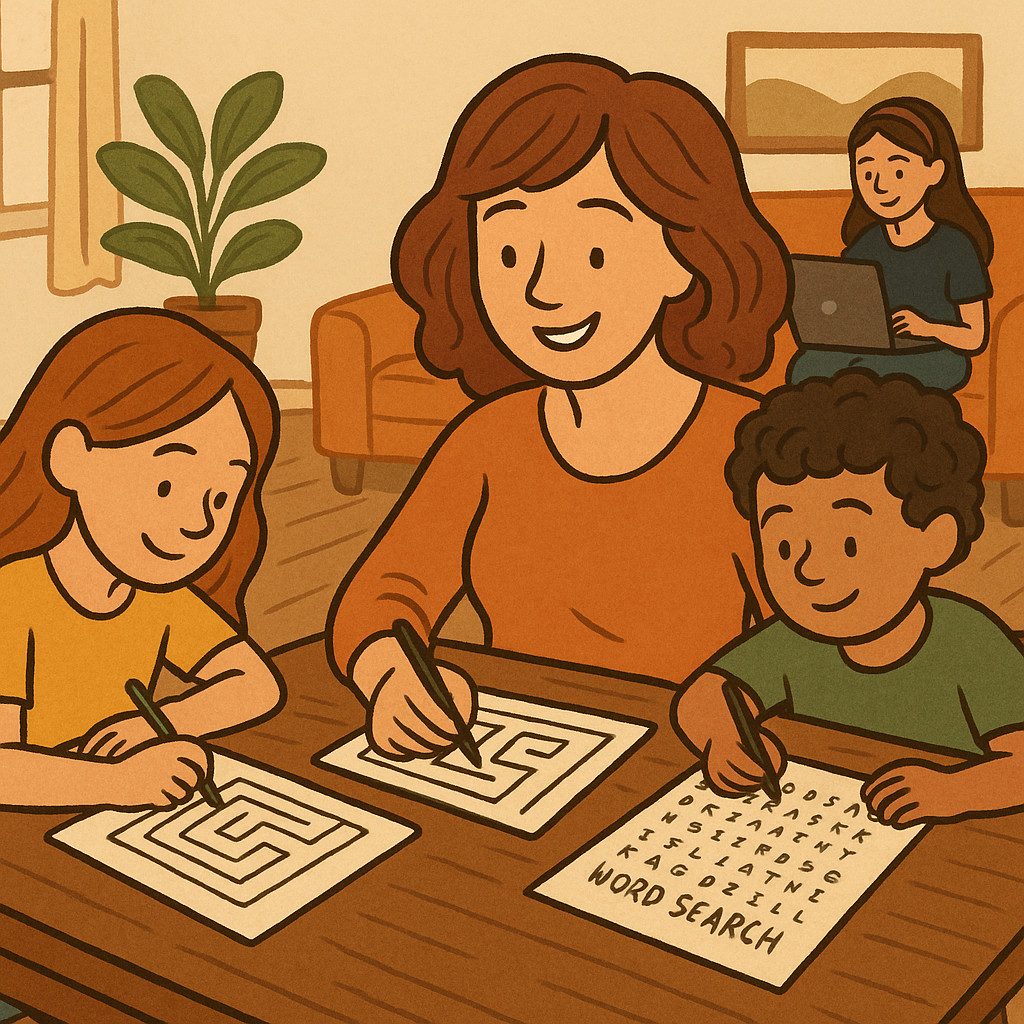By Sharon Whitaker

If you’ve ever tried to get a squirmy second grader to sit still for spelling practice, or helped a teen memorize science terms while cooking dinner, you know—learning at home doesn’t always look like a picture-perfect study session.
In our house, with four kids at different ages and stages, we’ve had to get creative. And over time, we’ve discovered something surprisingly simple that works like magic:
🌀 Mazes.
🔤 Word searches.
📚 Learning disguised as fun.
Why We Started Using Mazes and Word Searches
It all began with a little resistance.
My youngest groaned at spelling drills.
My middle child got overwhelmed trying to study vocabulary words.
And even my older kids—one in nursing school, another in middle school—craved something more playful to break up the stress.
So, one afternoon, I printed out a maze that secretly practiced reading direction words like left, right, up, down.
Then a word search with their science vocab hidden in a puzzle.
Suddenly, studying didn’t feel like studying. It felt like a game.
“Mom, can we do another one?”
That’s when I knew we were onto something.
✨ The Brain Benefits of These Simple Tools
These aren’t just busywork or filler activities. Mazes and word searches can help strengthen real cognitive skills:
🌀 Mazes build:
• Problem-solving and logical thinking
• Fine motor control
• Visual tracking, which supports reading development
🔤 Word searches improve:
• Spelling and word recognition
• Memory retention of academic terms
• Pattern recognition and attention to detail
And maybe most importantly?
They build confidence.
A child who finishes a maze or finds all the words on a page feels accomplished—and that confidence carries over into other subjects.
📖 How We Use Them in Our Home-school & Homework Routine
We don’t treat them as a replacement for formal lessons, but as a supplement—a break that still keeps minds engaged. Here are some ways we’ve used them in our home:
- Science & Nursing Vocab Practice
• My daughter in nursing school uses anatomy-themed word searches to quiz herself before tests.
• My younger son recently used a maze to review the parts of a cell—each path led to a different organelle fact. - Themed Word Searches for Holidays, Religion, or Units
• For Easter, we used a Resurrection-themed word search.
• During space week, we had a rocket-shaped maze labeled with planet names. - Quiet Time Brain Builders
Perfect for transitions, waiting rooms, or post-lunch “reset” time. I keep a folder of printable puzzles in the kitchen—no screens needed.
🛠️ Make Your Own Mazes and Word Searches!
Freefunprints.com offers my favorite free maze generator. You can even add images for your entry and exit, like a mouse and cheese.
They also have a great free word search generator as well.
Or, if you’re short on time (and who isn’t?), I’ll be sharing a few of our free printable study puzzles right here on MobiMotherhood—stay tuned!
❤️ Final Thoughts: When Learning Feels Like Play
Kids are naturally curious. When we offer them playful, low-pressure ways to engage with learning, something beautiful happens—they lean in.
So whether your child is preparing for a big test, learning to read, or just needs a confidence boost, try slipping a maze or word search into their routine.
It may seem simple, but these tiny tools can open big doors.
And if they ask for just one more page, don’t be surprised—sometimes, the best learning happens when they don’t even realize they’re studying.

